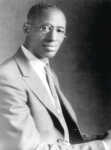Teacher, coach to be celebrated

Editor's Note: This is the first of a three-part series leading up to the presentation of a plaque to Fort Scott High School commemorating the achievements of Professor Ernest Jocquito Hawkins, who was recently posthumously inducted into the Kansas State High School Activities Association Hall of Fame.
It's hard to measure the impact of one man's life on an entire community, but local historians are attempting to do just that as they piece together details of the life of Professor Ernest Jocquito (E.J.) Hawkins, who was recently selected (posthumously) to the Kansas State High School Activities Association Hall of Fame Class of 2013.
To say Hawkins transcended sport is an understatement.

Hawkins, who led his Whirlwinds teams to a career .907 winning percentage, also was an educator and civic leader, who was inducted into the 2001 Kansas Teachers Hall of Fame, the first person to be inducted posthumously.
The son of slaves, Hawkins overcame overwhelming odds to make his mark on Fort Scott history. His father, Erastus Hawkins, was a stone mason and a Civil War veteran who served in the 2nd Kansas Colored Volunteer Infantry Regimen. E.J. was born in Fort Scott on May 26, 1875.
"Such resolve to form their own destinies must have been a Hawkins family trait, for Ernest so devoted his life to educating and uplifting African-American youth, despite the legal and not-so-tacit social challenges of racial segregation in Kansas," Fort Scott National Historical Site Superintendent Betty Boyko wrote in her nomination letter to the KSHSAA.
During the late 1880s, a number of parents of African-American students held peaceful protest marches up National Avenue so their children could attend Fort Scott High School. At that time, black students in the city attended The Plaza School until ninth grade, but had no outlet for secondary education. To be admitted to the formerly segregated FSHS, African-American students were required to pass a written test. Hawkins, along with several other black students, passed the exam and graduated from Fort Scott High School in 1891 at the age of 16, when he began his teaching career at the first Plaza School.
After five years of teaching, Hawkins was promoted to principal, according to former student Robert Nelson, who is currently on the Fort Scott Community College Board of Trustees.
In his letter to KSHSAA, Nelson said Hawkins was not permitted to attend local public in-service training for teachers. Undeterred, Professor Hawkins organized and began teaching seminars for black educators throughout the Midwest.
Hawkins continued his education at Kansas Normal School in Fort Scott and received his bachelor of science degree from Pittsburg State University in 1922. He also attended graduate school at the University of Southern California.
Boyko said that was "at a time when few African-Americans were afforded the opportunity to earn a college degree. Doing so demonstrated to his students that dreams could become realities. His motto of 'Look Sharp, Be Sharp, Be Somebody' gave untold positive encouragement to students who daily faced a greater society that, at best, often ignored them."
Hawkins taught until he died in 1946. Shortly after his passing, the second Plaza School was renamed the Hawkins School in tribute to the lifelong educator and coach.
Historian Arnold Schofield said that in addition to being an excellent coach, "Hawkins was an inspiring civic and church leader in Fort Scott."
Hawkins was a past president of the local NAACP, an Exalted Mason, a member of the Kappa Alpha Phi fraternity, a U.S. Army veteran and a coveted speaker throughout the Midwest.
Hawkins also was selected as a member of the Chamber of Commerce, a rare appointment for an African-American man at that time.
"He (Hawkins) is a fearless young man who cares more for the rights of his people than his job," lauded the Topeka Plaindealer in a 1928 article. "He allows no one to intimidate or steer him from his path of duty when it comes to defending the cause of the right, let it (be) white, black, or any other nationality."
Several events next week will honor Hawkins, including a luncheon presentation on "Fort Scott African-American Heritage-Prof. E.J. Hawkins" on Wednesday from noon to 1 p.m. at the Ellis Fine Arts Center. Presenters will include historians Schofield, Don Miller and Fred Campbell, former Whirlwinds member Roy Colum, Anne Colum, Elouise Young, Kirk Sharp and Jill Warford.
On Friday, Jan. 25, Hawkins will be formally inducted into the KSHSAA Hall of Fame during half-time of the Fort Scott-Iola basketball game at approximately 8:30 p.m.
Other inductees in the 2013 class include Kansas State University basketball player Shalee Lehning, Sublette; Lindsay (Eck) Gray, a track star at Beloit and later at Wichita State University; Richard Purdy, football coach at Shawnee Mission West and Lawrence High School; and Victor Sisk, former administrator at the Kansas State High School Activities Association.
